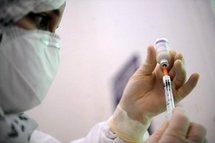
A doctor prepares a vaccine (AFP/File/Fayez Nureldine)
It involves Hannah Bruesewitz, who was left developmentally impaired after receiving a diphtheria, tetanus and pertussis vaccination.
Her parents are challenging decisions by two Pennsylvania courts that rejected their attempts to seek compensation from US pharmaceutical laboratory Wyeth, which made the vaccine.
The courts cited a 1988 law that prevents plaintiffs from seeking any "damages arising from a vaccine-related injury or death associated with the administration of a vaccine."
But Bruesewitz's parents and the US Supreme Court noted a Georgia court ruling allowed parents to bring claims against vaccine manufacturers.
"After exhausting administrative remedies in the vaccine program, children in Georgia who are injured by vaccines may bring design defect claims against vaccine manufacturers when the use of safer alternative vaccines could have avoided their injuries," the Supreme Court wrote in agreeing to consider the case.
"By contrast, Hannah Bruesewitz and children like her... may be precluded from pursuing identical design defect claims even when the same safer alternative vaccines could have avoided their suffering too," it added.
The Supreme Court also said that the Pennsylvania courts used an overly broad interpretation of the 1988 National Childhood Vaccine Injury Act and "improperly" ignored conditional language that would allow compensation claims.
"By holding all vaccine design defect claims preempted, the Third Circuit (court) robs seriously-injured children and their parents of their right to seek compensation... when safer alternative vaccines would have prevented their injuries," the Supreme Court said.
-------------------------------------------------------------------------------
Her parents are challenging decisions by two Pennsylvania courts that rejected their attempts to seek compensation from US pharmaceutical laboratory Wyeth, which made the vaccine.
The courts cited a 1988 law that prevents plaintiffs from seeking any "damages arising from a vaccine-related injury or death associated with the administration of a vaccine."
But Bruesewitz's parents and the US Supreme Court noted a Georgia court ruling allowed parents to bring claims against vaccine manufacturers.
"After exhausting administrative remedies in the vaccine program, children in Georgia who are injured by vaccines may bring design defect claims against vaccine manufacturers when the use of safer alternative vaccines could have avoided their injuries," the Supreme Court wrote in agreeing to consider the case.
"By contrast, Hannah Bruesewitz and children like her... may be precluded from pursuing identical design defect claims even when the same safer alternative vaccines could have avoided their suffering too," it added.
The Supreme Court also said that the Pennsylvania courts used an overly broad interpretation of the 1988 National Childhood Vaccine Injury Act and "improperly" ignored conditional language that would allow compensation claims.
"By holding all vaccine design defect claims preempted, the Third Circuit (court) robs seriously-injured children and their parents of their right to seek compensation... when safer alternative vaccines would have prevented their injuries," the Supreme Court said.
-------------------------------------------------------------------------------









 Home
Home Politics
Politics









